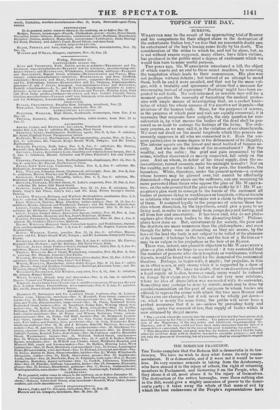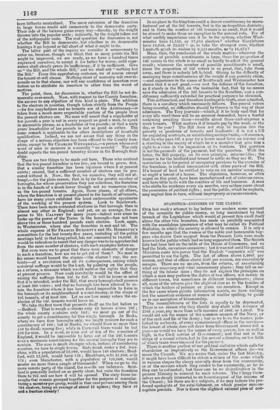THE BOROUGH FRANCHISE.
THE Tories complain that the Reform Bill is democratic in its ten- dencies. We have no wish to deny what forms its only recom- mendation. It is democratic, and if it were not it would be use- less. Its very essence consists in taking from the Aristocracy, who have abused it to the injury of others, the right of returning members to Parliament, and bestowing it on the People, who, if they abuse it at all, must abuse it to the injury of themselves. The destruction of the rotten boroughs, were there nothing else in the Bill, would give a mighty accession of power to the demo- cratic party ; it takes away the whole of that mass of evil by which the best endeavours of the People's .representatives have been hitherto neutralized. The mere extension of the franchise to large towns would add immensely to the democratic party. Their side of the balance gains every way—directly, by the weight thrown into the popular scale ; indirectly, by the weight taken out of the antipopular scale. The real question for discussion is, not whether the Bill be democratic, but whether in its democratic leanings it go beyond or fall short of what it ought to do. The latter part of the inquiry we consider it unnecessary to enter on, because, though we think that in many points the Bill might be improved, we are ready, as we have a hundred times expressed ourselves, to accept it for better for worse, until expe- rience shall clearly prove its inefficiency, if it be inefficient. Give us " the Bill, and the whole Bill," and we shall ask " nothing but the Bill." From this approbatory sentence, we of course except the tenant-at-will clause. Nothing short of necessity will ever re- concile us• to that clause, nor will any confidence of assertion ever induce us to attribute its insertion to other than the worst of motives.
The point, then, for discussion is, whether the Bill be not de- mocratic over-much. Now, with respect to the County franchise, the answer to any objection of this kind is plain. The addition to the electors in counties, though taken strictly from the People —for few copyholders and no tenants are of the Aristocracy—is taken from a much more respectable portion of the people than the present electors are. No man will assert that a copyholder of ten pounds a year is not in every respect as good a man, to speak in mercantile phrase, as a freeholder of ten pounds; or that a sixty years' leaseholder of ten pounds is not as good as either. The same remark is applicable to the other descriptions of leasehold qualification. Indeed, we are not aware that any thing in the shape of a serious objection has been offered to the County fran- chise, except by Sir CHARLES WETHERELL,—a person whose evil word of man or measure is assuredly " no scandal." The only doubt repects the ten-pound tenantcy clause in the Borough fran- chise.
There are two things to be made out here. Those who contend that the ten-pound franchise is too low, are bound to prove, first, that a similar franchise has been injurious where it at present exists ; second, that a sufficient number of electors can be pro- cured without it. Now. the first, we conceive, they will not at- tempt,—for the plain reason, that in by far the greater number of boroughs, for whose preservation they are solicitous, the franchise is in the hands of a much lower though not so numerous class, as the ten-pound tenants. Again, those places, of all others, where the franchise is at present placed in the hands of all tenants, have for many years exhibited the least unfavourable specimens of the working of the present system. Look to Southwark. There have been more contested elections in that borough than in almost any other in England; and yet, on an average, the ex- pense to Mr. CALVERT for many years—indeed ever since he broke up the power of the Tories in the borough—has not been above two or three hundred pounds each election. Look, again, to Westminster, where also the franchise is scot and lot. The whole expense of Sir FRANCIS BURDETT'S and Mr. HOBHOUSE'S committees for the last twenty-five years, including all the public meetings held in that long period, has not amounted to 10,0001. It would be ridiculous to assert that any danger was to be apprehended from the mere number of electors, with such examples before us.
But even were we to grant that there were elements of danger in such a franchise, how are we to get rid of them? No man in his senses would hazard the chance—the chance ? nay, the cer- tainty—of a revolution and all its consequences, among which universal suffrage would be the least, by palming on the people, as a reform, a measure which would narrow the rights that they at present possess. Now such inevitably would be the effect of raising the suffrage from 101. to 201. It will be borne in mind that it is intended, under the Bill, that every borough shall possess at least 300 voters ; and that no borough has been allowed to re- tain the franchise where it has been found impossible to form in the borough or its neighbourhood a constituency, in the shape of 10/. tenants, of at least 300. Let us see how many voters the ex- clusion of the 101. tenants would leave us.
We take the first town that presents itself on the list before us —Bedford. That borough contains only 43 houses above 20/. ; the whole county contains only 183: we must go out of the county to get a constituency for this single borough. In Beiks, where we have four boroughs only, we might procure for each a constituency of 400 ; but in Bucks, we should have no more than 540 to divide among five ; while in Cornwall there would be but 696 for nine. In a word, in nine out of ten of the counties of England, it would. he impossible to form out of the 201. tenants even a minimum constituency for the several boroughs they are to contain. The case is much stronger when, instead of considering counties, we turn to single towns. Gateshead, under a 201. fran- chise, with a population of 12,000, would have 140 electors ; Brad- ford, with 13,000, would have 128 ; Blackburn, with 21,000, only 176 ; even Manchester, with a population of 120,000, would muster no more than a couple of thousands! When we go to the more remote par4 of the island, the results are ludicrous. Scot- land is generally looked on as pretty close, but raise the franchise there to 201. and see how it will be opened. The sixty-three bo- roughs that remain grouped together for the purpose of manufac- turing a memberper group, would in that case possessamong them 964 electors, being an average of about 15 apiece ; they have 16 and a fraction already! In no place in the kingdom could a decent constituency be manu- factured out of the 201. tenants, but in the metropolitan districts ; and in these the number of 101. tenants is so small, that it would be absurd to make them an exception to the general rule. For of what earthly importance can it be to the system, whether West- minster have 15,166, or 17,681 electors ? whether Marylebone have 19,618, or 22;637 ? or, to take the strongest case, whether Lambeth speak its wishes by 9,224 mouths, or by 16,872 ? Hear, then, the conclusion of the whole matter—wherever the number of possible constituents is large, there the proportion of 101. voters to the whole is so small as hardly 'to affect the general result; wherever the number of possible constituents is small, there the proportion of 101. voters is so great, that, take them away, and there is nobody left behind. Giving to the difficulty of managing large constituencies all the weight it can possibly claim, —and experience in the cases of Southwark and Westminster has shown that it is not great,—we rest the defence of the franchise, as it stands in the Bill, on the invincible fact, that by no means save the admission of the 101. tenants to the franchise, can a con- stituency sufficiently extended for practical purposes be obtained. This arithmetical, and therefore irrefragable truth, once admitted, there is a corollary which necessarily follows. Ten-pound voters being essential, no difficulties should be thrown in the way of their admission. The Tory journals—which, if it be truly said that for every idle word there will be an account demanded, have a fearful reckoning awaiting them—twaddle about three-and-sixpence a week tenants. What matters it if tenants pay by the week, or the day, or the year ? The Bill does not stop to inquire into the poverty or prudence of tenants and landlords : it is not a bill for regulating contracts, or establishing-savings hanks,—it assumes, that he who pays 10/. a year for a house must have an income and a standing in the society of which he is a member that give him a right to a voice in the imposition of its burdens. The question is not the quomodo of the payment, but the quantum. With the latter, the Bill properly, on its .own principle, intermeeldles ; the former is for the landlord and tenant to settle as they see fit. The restriction as to the period of occupancy previous to the exercise of the franchise, is indeed inconsistent with other parts of the Bill. If a tenant of land be entitled to vote on six months' occupancy, so ought a tenant of a house. The objections, however, so often urged on this point, have been manufactured out of extreme cases, and have little to do with the realities of life and business. A man who shifts his residence every six months, very seldom cares about the possession of political rights ; and the public, which he neglects, may neglect him in turn, without impropriety or inconvenience.



























 Previous page
Previous page